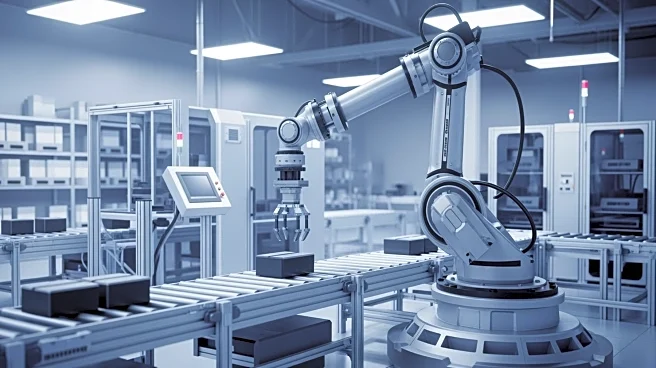What's Happening?
Amazon is reportedly working towards automating 75% of its operations, which could result in the elimination of 160,000 U.S. roles by 2027. This move is part of Amazon's strategy to save approximately $12.6 billion from 2025 to 2027, reducing costs by about
30 cents per item in its warehouses and delivery services. The automation initiative is expected to transform Amazon from a major job creator to a net job destroyer, according to Daron Acemoglu, a Nobel Prize-winning economist. In response to potential backlash, Amazon is considering ways to improve its image as a 'good corporate citizen,' such as participating in community projects and using less controversial terms like 'advanced technology' instead of 'automation' or 'AI.'
Why It's Important?
The automation of Amazon's operations could have significant implications for the U.S. labor market, particularly in the retail and logistics sectors. As one of the largest employers in the country, Amazon's shift towards automation may lead to substantial job losses, affecting thousands of workers and their families. This development raises concerns about the broader impact of automation on employment and the economy, as companies increasingly adopt technology to streamline operations and reduce costs. The potential job losses could also spark debates on the need for policies to support displaced workers and address the challenges posed by technological advancements.
What's Next?
Amazon's automation plans may prompt reactions from various stakeholders, including political leaders, labor unions, and community groups. There could be calls for regulatory measures to ensure that the transition to automation does not disproportionately harm workers. Additionally, Amazon's efforts to mitigate backlash by engaging in community projects and rebranding its technology initiatives may influence public perception and corporate responsibility discussions. The company's approach to handling the anticipated job losses will likely be closely monitored, with potential implications for its reputation and business operations.
Beyond the Headlines
The ethical and social dimensions of Amazon's automation strategy highlight the need for a balanced approach to technological progress. While automation can lead to increased efficiency and cost savings, it also poses challenges related to workforce displacement and economic inequality. The situation underscores the importance of developing policies that support retraining and reskilling programs for affected workers, ensuring that technological advancements contribute to inclusive growth and societal well-being.
















